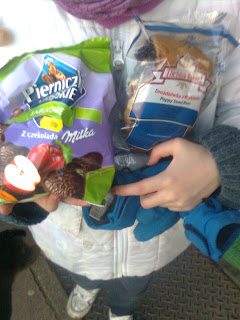This blog is about family travel around the world without leaving the UK. Impossible? No. Here's how a trip to Harrow took us via Poland and Lithuania. This post is by Nicola Baird
Potatoes are always cheap, right? Wrong - how about heading to a Polish food store to find ones with real mud from home, or rather from Poland or Lithuania? That's what you can do in west London. Of course in the UK we are long used to getting potatoes from all over the world, the first new potatoes in supermarkets are often from Israel, but there is something truly forlorn about needing the taste of home-grown potatoes.
Don't let that stop you from having a good look, and perhaps a taste too, of the goodies on offer in one of these stores. I left with delicious apple and spice chocolate covered biscuits (more like a Jaffa Cake) and also a large poppy paste breakfast roll. Heated up this had an almondy-taste which my kids found a bit strange, but the adults in the house enjoyed enough to be going back for more. Given the amount of elderly poppy seed I have in my store cupboard at the moment, this certainly gave me inspiration beyond lemon and poppy seed cake, or poppy seed bagels.
Unique Polish foods include birch and bilberry juice, cow candy, dried mushrooms and pickled garlic. You could spend a lifetime learning about the clever ways Poles have devised to preserve food, and of course potatoes are an important item too featuring in borscht and cabbage soup. And then there are pierogi (filled parcels boiled or crispily baked). It may be hearty peasant/hunter food, but what could be more warming on a cold winter's day? Now all I need is a few Polish friends to help me explore Eastern European cooking. Any offers or recipes?
From Warsaw life:
Bigos – A traditional stew native to Poles and Lithuanians, bigos is considered to be Poland’s true national dish and its composition can vary from region to region, village to village and restaurant to restaurant. This hunter’s stew is a staple of every Polish family so be sure to sample it during your stay. Fresh or fermented cabbage forms the base of the meal to which either whole or pureed tomato is added alongside cuts of meat mainly, but not exclusively kielbasa or pork and finished off with honey and mushrooms. The dish is traditionally accompanied with rye bread or potatoes and is typically served on the second day of Christmas. Its high concentration of vitamin C, the ready availability of cabbage and general heartiness made it a classic and nutritionally fundamental dish during centuries and centuries of cold winters. Wash it down with shots of ice-cold vodka for the authentic experience.
Want to find out more?
For a huge amount of Polish and East European info in London - mostly history, themed bars, vodkas, restaurants and food stores see here. Some more good recipe code-crackers from Warsaw life here.







2 comments:
From Facebook:
Annie it's all borscht and sauerkraut around here..... (wales)
Nicola Baird I thought of you while watching Living with the Amish - an awful lot of pickling going on. Strange so little is done here in the UK. Happy new year BTW!
Annie the only salt preserving of veg. i've ever seen reference to is runner beans. It is strange. Someone was wondering whether the accessibility of malt vinegar from the beer industry stole the show somehow. Happy New Year to you too. I hope to see you soon xoxo
Nicola Baird @annie, I think I sent you this link before - seems like you can charge good money to teach pickling. I love the way sophie says pickled veg on toast remains the best snack ever! http://sophieminchilliinlondon.blogspot.com/2011_11_01_archive.html
Roger: "We too, Nicola, have been sampling the delights of the nearest Polish deli. But I think you are a bit hard on them over their buying imported potatoes. Having grown three varieties of potato this year (and a fourth last year), I think we underestimate the differences between them and the need to use the right potato for the right job."
Post a Comment